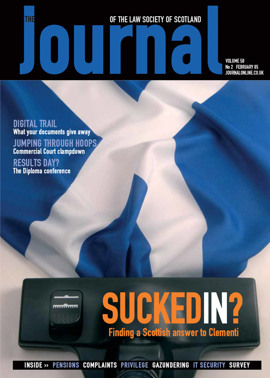An elusive model?

How to create a Diploma that will equip graduates to quickly become competent, worldly-wise trainees across the myriad of contrasting firms or organisations at which they could potentially commence their fledgling legal careers? That was the challenge facing delegates at the Society’s recent conference debating the future of the Diploma.
Traditional criticisms of the Diploma have focused on it being perceived as an extension of student life and university culture, rather than a true stepping stone into practice, the corollary of which is that it is generally not sufficiently practical to prepare trainees for the sort of situations they will face in everyday practice. As a result many law firms have little confidence in the Diploma’s worth as a preparation for the traineeship and are unable to formulate their training with any degree of certainty as to the core skills and competences the trainee will possess.
In truth, the mood at the conference reflected a pragmatic realisation that the perfect model would probably always be elusive, though that should not deter efforts to improve on a course that even its staunchest supporters admit has significant shortcomings.
Central to informing the debate, and offering evidence of the Education and Training Department of the Law Society of Scotland’s commitment to fostering an informed and frank debate into the subject, was Fiona Westwood’s account of her Society-commissioned comprehensive consultation with trainees and training partners into whether the Diploma’s present format serves the needs of firms, and their requirements for trainees with at least the basic skills and knowledge required to commence legal practice.
Westwood’s research highlighted four comments which were reiterated across the board: employers saw no consistency across trainees, regardless of deliverer; the trainee experience was highly subjective, depending on the deliverer, quality of subject and/or individual interest; the lack of context of working in practice limits students’ ability to learn; and there is a lack of clear linkage with the LLB.
She reported that comments on the content of the Diploma tended to suggest there is not enough emphasis on what trainees will have to do in practice. Without prior work experience the Diploma is too remote from the reality of office life. A greater emphasis on honing drafting and writing skills, legal analysis and problem solving would see students better equipped for practice. The materials too need to be more focused on being useful as styles or checklists for the working environment.
For trainees and trainers there exists an expectation deficit. In some cases, the trainer was assuming too little knowledge; in others the trainer was disappointed at the shortcomings of trainees from whom they expected more after their years of academic training.
Strong views from the providers
Contributions from Diploma providers presented a contrasting view of the worth of the course in its present format. For Alan Barr, Head of the Diploma at the University of Edinburgh, the whole day was a wasted Saturday for the delegates in attendance. Rather than looking at yet another review of the Diploma, their time would be better spent assisting in drafting and updating the present materials available, which, said Barr, represented the major flaw of the Diploma in its present format.
In fact, argued Barr, navel gazing and that most ridiculous of modern management phenomena, “blue sky thinking”, were easier than the hard graft of writing and updating styles and materials. Acknowledging that the Diploma was far from perfect, he suggested the key to its improvement lies in honing the details rather than further reinventing the basic structure.
Echoing Barr’s theme, David Brand from the University of Dundee also appealed for a greater focus on core materials. The present materials were of variable quality, often inaccurate and not updated. Some of them merely repeated undergraduate work or offered poor styles of limited use in a practical setting. In some instances the materials were too advanced; on other occasions they ignored or omitted vital components altogether. He appealed for more sharing of successful material, and urged the Society to lead the drive for better materials by co-ordinating and motivating the profession to get involved, even if that meant paying authors of materials properly or entering into contracts with contributors.
From the Glasgow Graduate School of Law, Paul Maharg urged an “outcomes based” approach to the Diploma. Starting from a statement of what a person ought to be able to know, do and understand by the end of the course, teachers and students would have a clear expectation as to what the Diploma was intended to achieve.
He appealed for lawyers and educationalists to work together to provide a clear focus on the essential knowledge, skills, attitudes and values that Diplomates should possess at the conclusion of the course. Drawing on the experience of the medical profession, where the so-called “design-back” approach is adopted, would help such a focus on standards in the skills required of practising lawyers.
Further fresh perspectives were offered by Karen Barton of the GGSL. From the starting point that there is an increasing realisation that conventional forms of assessment often test only a narrow range of knowledge and ability, the answer could be found in the form of portfolios, a system of vocational training widely adopted in professions such as engineering, chartered surveyors, teaching and in medicine.
Possible advantages, suggested Barton, included the potential to amass a structured collection of labelled evidence and critical reflection of that evidence, providing an integration of learning and assessment. Critically, it moves students from describing their course in terms of subjects or assessments to describing learning and achievement.
The theme of portfolios was expanded by the Society’s Deputy Director of Education and Training, Neil Stevenson. Putting flesh on the bones, he presented a potential model of learning logs, significant event analysis and skills assessment tools that could provide the platform for ongoing learning from the Diploma through the traineeship and beyond.
A radical integration
Finally, offering a radical alternative, Philip Plowden, Associate Dean of Clinical Legal Education at Northumbria University, presented a model they have been running since 1992, which over four years integrates the vocational and academic. Integration begins in year 1 and during the course students undertake full casework, supervised by a member of staff, including criminal appeals, employment, housing, family, civil claims, mental health cases, welfare benefits cases and even commercial litigation.
The advantages outlined by Plowman of this unique approach to the formative years of legal training included enhancing the learning of black letter law and vocational law by letting each inform the other, offering the potential for deeper skills progression by enhancing the learning of skills running over four years and in context. The course also builds in time and space for integrated live client work.
Of course this format militates against the study of law as a traditional arts degree, but for the profession in England it has helped create a new and aware breed of young lawyers with a deeper understanding of law in context, fully embedded with an ethical awareness, suggested Plowman.
For those charged with the task of considering whether the Diploma needs to be fixed, and if so, how, the formal presentations and breakout workshops alike offered plenty of food for thought.
Whatever the outcome of the review, and whatever model emerges, there seems to be a consensus that updated, comprehensive and relevant materials are urgently required to improve any future format.
Commitment of the profession?
Equally there is a feeling that the profession at large needs to commit more to the notion that training the solicitors of the future is important and something firms should give time and resources to. They cannot expect universities to do it all and the profession ought to be proactive in shaping the education of its future members. In fact, the profession is often recognised as being generally dismissive of ongoing education as a whole, with many viewing CPD, for example, as an onerous obligation rather than part of an ongoing process of learning and improving.
As a starting point the conference offered a constructive forum to generate debate as to the shortfall of the present format, and spark fresh ideas and some genuinely radical and creative thinking as to how it could be revamped or indeed entirely replaced. With the Society indicating a willingness to listen to all ideas and particularly to address the concerns of firms whose expectations of the Diploma are not being met, the profession must respond to that willingness to address the issue, and at the same time show that the credibility of the teaching of the next generation of lawyers matters at a time when the profession has scarcely been under more widespread and potentially far-reaching outside scrutiny.
Roger Mackenzie is a trainee and a former Deputy Editor of the Journal.
In this issue
- Sell or transfer? (1)
- Promoting competition or competitiveness?
- Promoting competitiveness or competition?
- Not the final word
- Challenge of the FSA
- The pull of the south
- A world of change
- Finding the path
- An elusive model?
- Bank on it
- Trouble at t'mill
- Hidden evidence
- Money claims on behalf of children
- Secure connections
- Tread carefully
- Sell or transfer?
- Cracking the conflict code
- X Factor for success?
- Scottish Solicitors' Discipline Tribunal
- Website reviews
- Book reviews
- Is "gazundering" always bad?
- Defining the guideline






